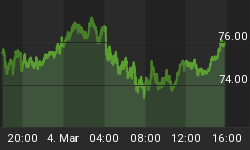The following is part of Pivotal Events that was published for our subscribers February 18, 2010.
SIGNS OF THE TIMES:
Last Year:
"The amount of money in the economy is growing too slowly - needs boost."
- Bank of England Governor, Mervin King, February 26, 2009
This inspired our departed friend, David Brown, to draw the attached cartoon.
The unexpected second part of the crash to early March resolved when the ChartWorks on February 27, A Significant Change, called for a weaker dollar, which would "likely be sufficient to overwhelm extreme dismay". A post-crash rebound was becoming possible.
The March 2 ChartWorks updated the S&P and noted that our indicators were getting very oversold and that the 643 level could clear the market. It cleared at 666 on March 10.
* * * * *
For some time we have been playing around with a title for an imaginary article "Great Moments In Disco", along with one about "Great Moments In Macroeconomics". Well, it has always been impossible for the former, and, sadly, it now seems too late for the latter.
"Rethinking Macroeconomic Policy"
"What is clear, however, is that the behavior of inflation is much more complex than is assumed in our models. And we understand the relationship between activity and inflation quite poorly, especially at low rates of inflation."
- Prof. Olivier Blanchard, Econometrician, MIT, February 2010
Score one more for the tag team of Mother Nature and Mister Market.
The recent scare in the sovereign debt market seems to have eased a little. International Relations and Security Network had a good headline "Greek Tragedy Averted", but there seems to be a general lack of boasting that the problem was "isolated" or could be "contained".
Such problems are the result of "easy" credit which is one of the features of a new financial era and the consequence has always been a long contraction. Events following the financial mania the climaxed in 1873 have always been instructive - particularly as the US had a Treasury System that was celebrated as superior to a central bank. America was then between central banks.
During the financial asset speculation that completed in 1873, Sterling was the reserve currency and London was the world's financial centre. S.G. Checkland is an economic historian and the following is quoted from The Rise of Industrial England, published in New York in 1965:
"The American cotton crop could now earn more abroad, and by 1870-1 was of immense size, greatly aiding the recovery of the United States, though damaging the commerce of India and Egypt. Activity soon became more brisk, and though American iron output increased rapidly by the spring of 1871 Britain was receiving very large orders for iron. The task was resumed of completing the world's telegraph system, including China, Australia, and both sides of South America.
Foreign government financing mounted to a crescendo between 1870 and 1873. Germany, Russia, Austria, and other countries, at last in a position to engage fully in the industrial race, were making increasing haste to equip themselves, straining every nerve. Eastern and central Europe were swept by a promotion mania. New foreign borrowers appeared in London and found acceptance. Many half-barbarous states pressed eagerly for funds, and spent them with no display of wisdom, sometimes to compound, at extortionate rates, old debts, sometimes in hopeful response to the blandishments of projectors. Among these casual states were Turkey, Egypt, Honduras, Romania, and a swarm of South American countries. "We are to them", said Walter Bagehot, "what the London money dealers are to students at Oxford and Cambridge". For promoters busied themselves stimulating in such countries a sense of the need to borrow, and its bewitching simplicity. The British colonies of Canada and Australia also made their claims. Under the new pressure of transactions the Stock Exchange in the ten years down to 1873 at least doubled in size."
A few pages later, Checkland starts a section with:
"The long failure to recover after 1873 provoked much discussion. At first there was a strong tendency, especially in the absence of crisis, to minimize the difficulties."
The irony in Checkland's text is evident with the urge to lend money to "half-barbarous states" and the "need to borrow and its bewitching simplicity", and then the tendency to "minimize difficulties". These events occurred well before the cult of omniscient economics, but as with any financial mania there was an agency brilliant enough to prevent a boom from crashing. In 1873 it was the US Treasury and its celebrated secretary.
We have frequently mentioned that mainstream economists intensely discussed The Great Depression (1873 - 1895) until 1940 when they discovered another one. (For example: Investment and The Great Depression - W.W. Rostow, Economic History Review, May 1939).
Financial history suggests that when the bubble in sovereign debt collapses it takes a long time to wring the excesses out of the system. For example Barings failure in 1890 was due to the attempt to bailout the collapse of the Secretan Copper Corner in 1888 and the amount of Argentine debt carried in its book. Barings was one of the most important merchant-banks in history.
Of course there is no guaranty that the classic post-bubble contraction will continue to follow the path, but then there is no guaranty that it won't. Best to be informed and to consider the odds.
* * * * *
Link to February 19, 2010 'Bob and Phil Show' on Howestreet.com: http://www.howestreet.com/index.php?pl=/goldradio/index.php/mediaplayer/1563
MUTUAL FUND CASH POSITION

Source: Contrary Investor
- Latest posting is just below the low reached in 2007.

"The amount of money in the economy is growing too slowly - needs boost."
- Bank of England Governor, Mervin King, February 26, 2009















